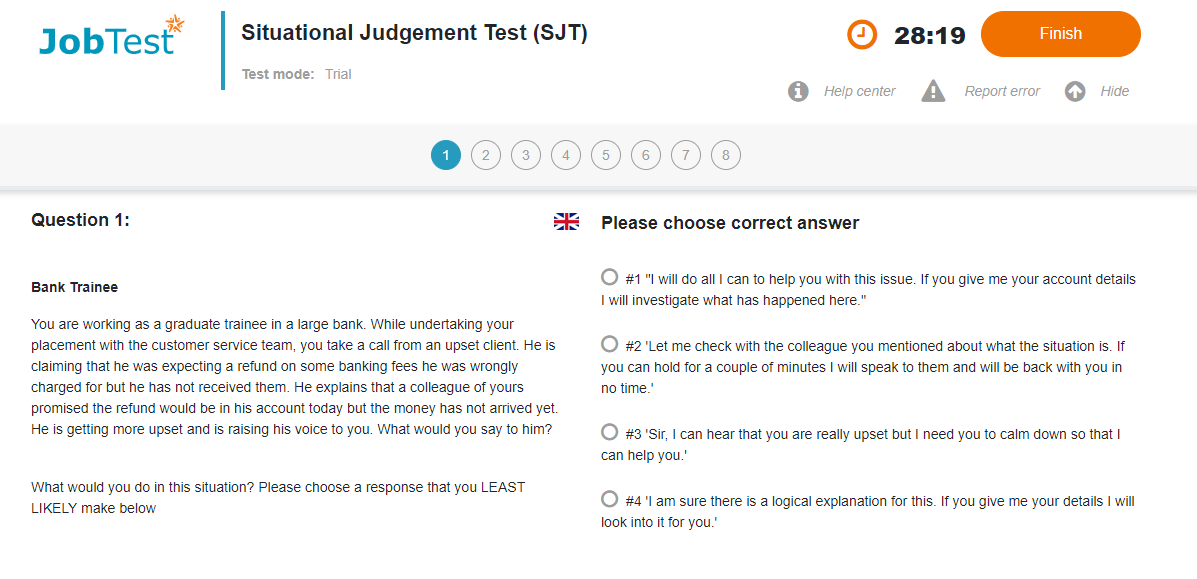
Situational Judgment Test (SJT)
- Understand the behaviors and attitude of a person in work-related situations.
- Deal with challenging situations you might experience in the job for which you are applying, to measure soft skills such as Leadership, Communication, Client focus, Decision-making, Problem-solving, Working with others, Priority and Organization, Results and Quality Driven, and Learning and Development.
Competency Assessment List
-
{{ !_.isEmpty(item.question_packages) ? item.question_packages.length : 0 }}
-
{{ _.isNumber(Number(item.duration)) ? item.duration : 0 }}
-
{{ _.isNumber(item.tested) ? item.tested : 0 | money }}
Situational Judgment Tests (SJTs) are a type of popular aptitude/psychometric test that measures behaviors and attitude of a person in work-related situations. This type of test presents candidates challenging situations that they might experience in the job for which they are applying, to measure soft skills such as Leadership, Communication, Client focus, Decision-making, Problem-solving, Working with others, Priority and Organization, Results and Quality Driven, and Learning and Development.
For each situation, several possible actions are presented and candidates have to identify the most and the least effective answers to solve the problem described. Situations Judgment Tests (SJTs) are useful for assessing soft-skills, non-academic behaviors, and practical intelligence to select the right candidate for a job. These tests are used by private and public organizations in the recruitment and selection process. Many employers from various sectors are using them: banking & finance, consultancy, audit, energy, FMCG, IT, oil & gas, media or public institutions, etc.
Why do recruiters use Situational Judgment Tests?
For the recruitment procedure, recruiters need strong tools in order to identify potential strong performers having the right competencies/skills among all the candidates.
Aptitude/psychometric tests are offering benefits to reach this target:
- Cost-effective – In most case, SJT will be done computer-based and are standardized.
- Powerful tests – Validity and reliability of this type of test has been demonstrated through many types of research. They can predict the future performance of candidates.
- Convenient – Easy to use with quick results to get candidates’ profiles, and identify the strengths/weaknesses.
Target Group: Directors, Managers, Professionals, Graduates & Management Trainees.
Test Structure: The situational judgment test consists of 08 questions with work-related issues simulation and the duration is 20 minutes.
Relevant for Industries
- Banking & Financial Services
- Airlines
- Automotive
- Education & Training
- Logistics & Forwarding
- Life Sciences
- Manufacturing
- Oil & Gas
- NGO & Public Sector
- Retail
- Telecommunications
- General Corporate Functions
- Consulting Services
Most often tested categories
- Logical Reasoning Test
- Numerical Reasoning Test
- Verbal Reasoning Test
- Abstract Reasoning Test
- Diagrammatic Reasoning Test
- Data / Error Checking Test
- Faults Diagnosis Test
- Mechanical Reasoning Test
- Critical Reasoning Test
- Situational Judgment Test (SJT)
- Psychometric Test
- Tư Duy Không Gian
- Post-training Test
- English Reading Test
- Situational Judgement Test (SJT)
- DISC Awareness
- English Skill
- GOLD 2024 - English Test
- Product Knowledge
- English Listening Test
- Numerical Reasoning
- Verbal Reasoning
- Non-verbal Reasoning
- Situational Judgement
- Critical Thinking
- Problem Solving
- Job & Income
- Managers, Colleagues
- Company
- EVP
- CT Group
- Essay
- Abstract Reasoning Test
- Numerical Reasoning Test
- Critical Reasoning Test
- Situational Judgment Test (SJT)










